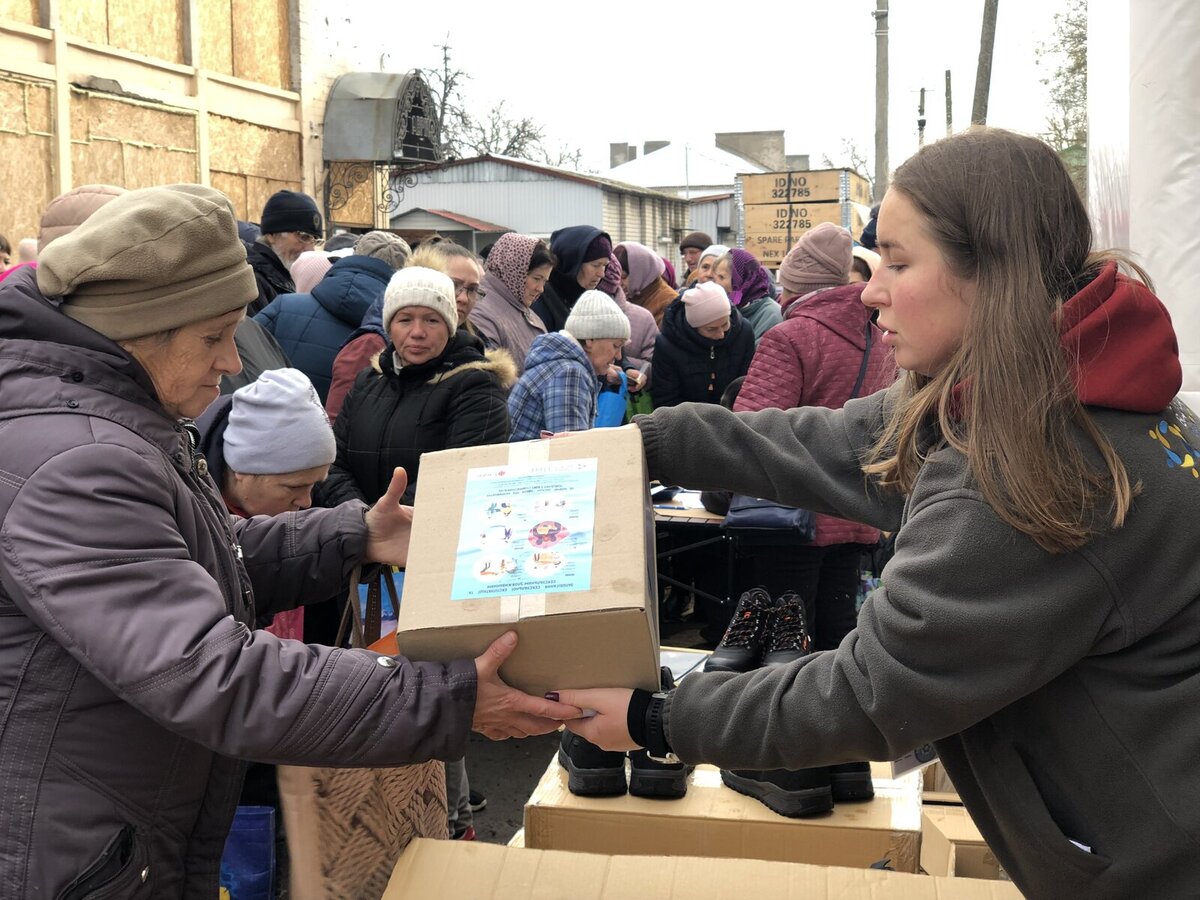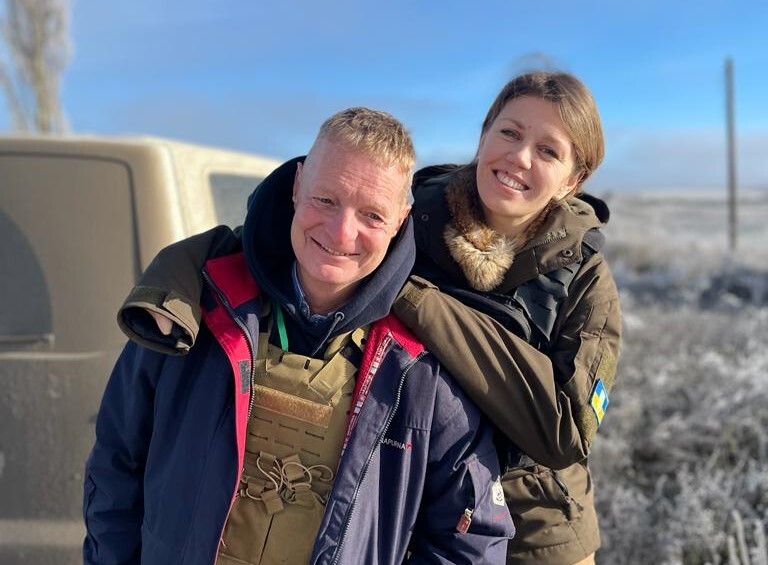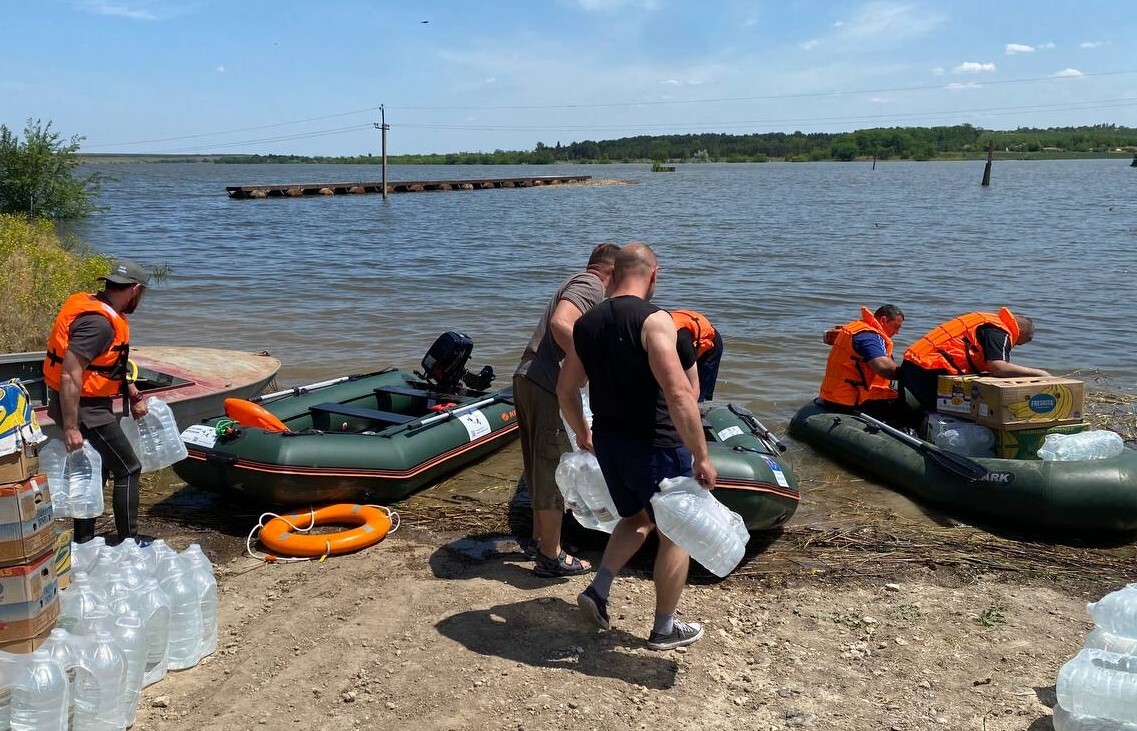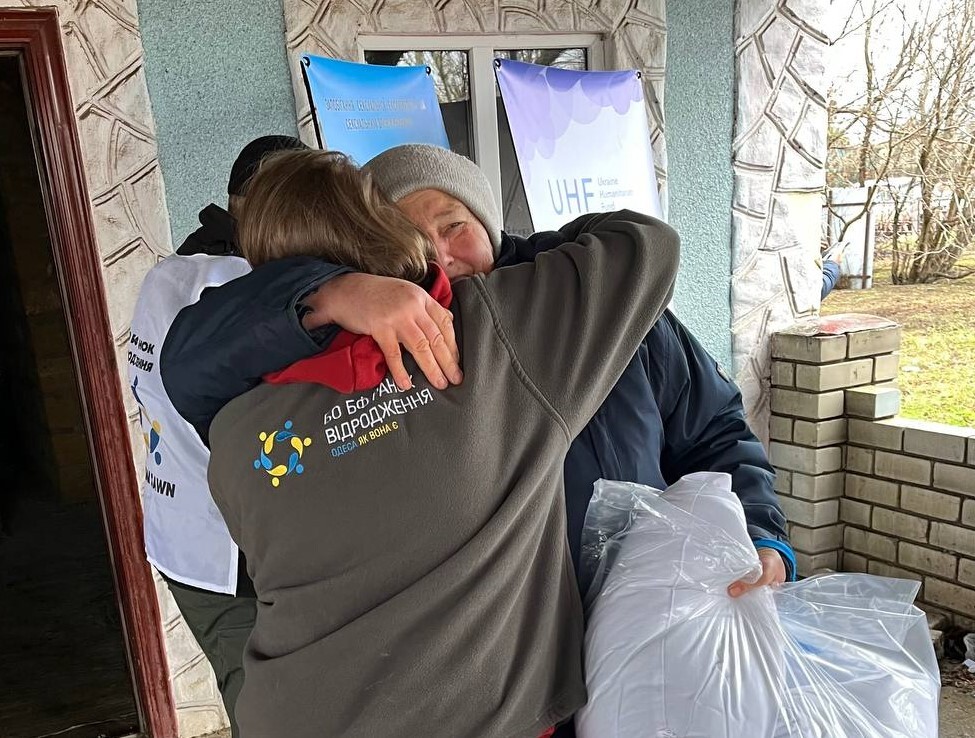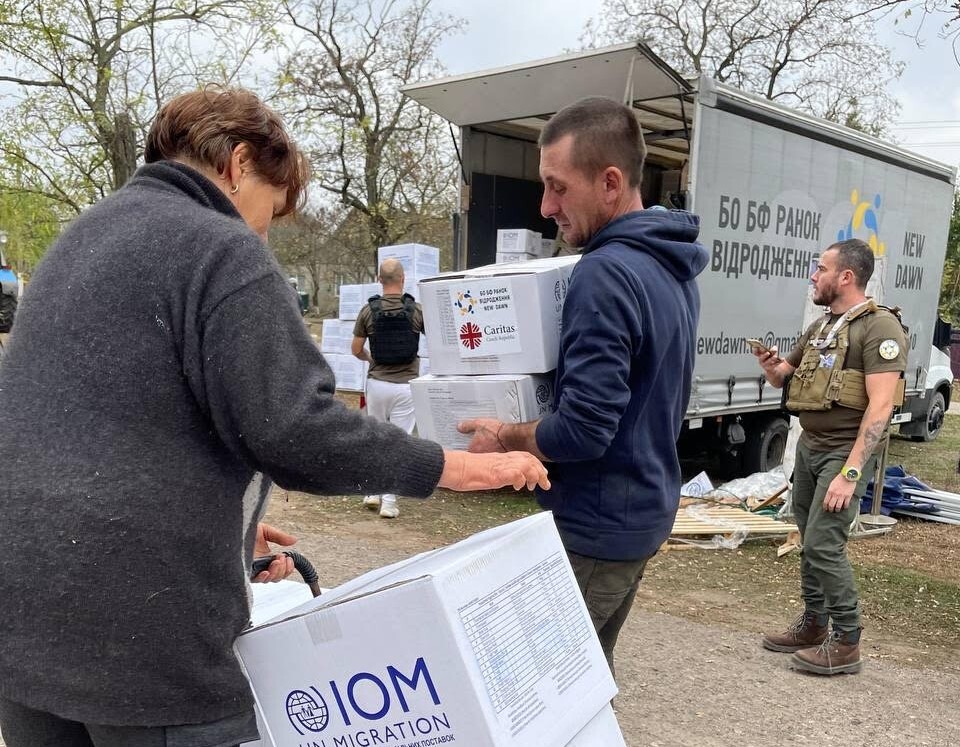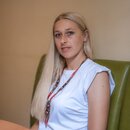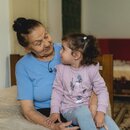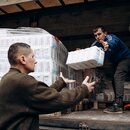What is it like to provide humanitarian aid to frontline communities? What are the risks of working in war-torn Ukraine? We spoke with Philipp Francke and Julia Pogribna, the initiators of the Charitable Foundation New Dawn, our partner organisation in Southern Ukraine.
You have been supporting people in Ukraine from the very beginning of the war. How has the assistance changed since the Russian invasion in 2022?
Philipp: In 2022, our main activities were connected to food security and all kinds of life-saving support. Whereas now the response activities are adapted to the changing situation. On the frontlines, New Dawn is one of the few organisations that has the competency, security trainings and, most importantly, also the support of the military administrations and other authorities. The direct frontline zones are very dangerous because of shelling and explosions which make the last-mile deliveries quite challenging operations.
In the de-occupied zones and the “zero” zone (which means a battlefield or a war zone) we are now rebuilding houses, roofs, windows, schools, hospitals. In the winter we distribute coal and firewood. We are also reconstructing or repairing the infrastructure of public service providers, such as canalisations, pipes, boreholes for water supply, the agricultural irrigation systems. Of course, only in areas that already have been demined. You know, this is actually one of the most heavily mined places in the world. So, our activities are now more adapted to the primary needs with regard to regaining livelihoods, but also the first response with basic life-saving necessities are on the daily plan. The regions of Mykolaiv and Kherson are huge and heavily affected. Basic humanitarian interventions will be needed for many years to come.
In which regions of Ukraine do you support people now? How often do you visit these communities?
Philipp: Our headquarters are in Odesa. The reason why we stay here is quite obvious. For a long time, but unfortunately not now, Odesa was quite safe. We have big warehouses here. Also, we are next to the border, which is necessary since lorries that bring our in-kind donations from Europe on a daily basis are more likely to come to a relatively safe region. This is useful for us because logistics inside of Ukraine are complicated. And the operational field-teams are mainly active in the rural areas of de-occupied Mykolaiv and Kherson regions.
Yulia: We visit the affected communities almost every day, especially since we have been supporting them to prepare for winter together with Caritas Czech Republic. In total, we help 21 communities in the Mykolaiv and Kherson regions.
Philipp, please tell us about your background and what led to your decision to come and help Ukraine? Also, would you share the story of how the Charitable Foundation “New Dawn” was founded?
Philipp: Well, I am German and I am a Member of the Order of St. John's. In the beginning of the war in Ukraine we had a reunion with other members of the Order, and there was a need for a driver to deliver humanitarian aid. Though it was a little bit chaotic, everybody tried to help somehow. This was the beginning of all: a first big convoy of 7 vans and buses with medicaments and equipment. But I didn't want to deliver this to the usual borders where the aid was just piling up, which of course was unsatisfactory. That’s why I had a more precise look on the map and found out that to the South of Ukraine, aid was not delivered at all. After some research, I met Julia. At that moment Julia had already a very dynamic organisation of volunteers that just wanted to help the country. And I, being a representative of some food industries in Brussels, could help with fundraising. We met at the Ukrainian border and decided that we should cooperate to be more supportive and effective. Very quickly we got more and more support and funds from European institutional and private donors. This is in very short about how New Dawn was born. Now Yulia is the Chair Lady of New Dawn, and I’m its Godfather (laughing).
How many people work for New Dawn at the moment?
Philipp: We have approximately 25 permanent staff. And every day there are around 70 or 80 volunteers. Our team - the volunteers as well as officially employed people - is working really hard for almost 2 years night and day. Therefore, we got a level of specific training that is quite unique in NGOs in the southeast of the Ukraine. This means that we can quite efficiently carry out projects that otherwise are just too complicated for younger organisations – due to manpower, due to training, knowledge, and administrational capacity.
You have been cooperating with Caritas Czech Republic in Ukraine for a year now. Can you tell us more about this partnership?
Yulia: Our collaboration with Caritas Czech Republic began in January 2023. At that time, it had been 3-4 months since the liberation of Kherson, and we were actively involved in helping the affected communities - distributing construction materials and essential humanitarian aid: food, hygiene kits. Many people in Kherson and Mykolaiv regions had their homes completely destroyed, and all household items were either stolen or destroyed. People were in need for almost everything. Initially, our distribution project with Caritas Czech Republic was for six months, and later, it was extended to a year.
When the Kakhovka disaster occurred in June, Caritas Czech Republic quickly joined in with two significant donations, allowing us to purchase boats, engines, food, and generators. Also, in cooperation with Caritas Czech Republic, we drilled 5 boreholes, fully connected the city Snigurivka to water supply, which was completely destroyed after the flood. We installed mobile toilets, because the hygienic situation was catastrophic – the wastewater system was not functioning. Also, we bought bob-cats for the Snigurivka community to help clear the roads and accesses. We distributed hygiene and food kits in large quantities to people who were (and mostly still are) cut off from the markets or any facility to self-supply. Within this project, we continue to collaborate to this day, such as drilling two more wells.
All this set the foundation for a strong partnership, as Caritas Czech Republic in Ukraine estimated our strengths, acknowledging our on-the-ground presence and responsibility. And we appreciate the support and flexibility of Caritas Czech Republic in Ukraine.
PEOPLE WANT TO LIVE AT HOME
Why do some people still prefer staying in the risk areas? I assume most people have relocated to safer regions.
Philipp: There are many reasons for people not to leave. First thing is that Ukrainians love their homes and their country. Secondly, people often have family-based reasons, like their parents do not want to go but they cannot leave them alone. Others just don't know where to go and don't have the money to move elsewhere. For some others, also the opportunity to stay in the country and move to refugee camps in the West is no option, because it is hard to find a job or any good occupation there. But Ukrainians here want to do something, they are active people.
We are confronted with many different situations in the families on the frontlines. Of course, many young families left in the very beginning of the war. But there are still frontline villages with children. Some young families preferred to come back to their destroyed houses then to stay in, say, Germany or France, where they just did not feel at home. Even though they were probably better off financially abroad. And then of course, there are a lot of elderly people.
How do they respond to the aid your teams bring? What do local residents currently need the most?
Philipp: Well, the situation changes all the time. Last year, just after the liberation of Kherson, people were so proud and happy at the beginning, but they were also traumatised and the situation overall was a bit complicated. The situation was also different from village to village. We entered villages in which the people were crying of joy that we finally came. But sometimes people were confused, they did not know who we were or what was happening. They sometimes thought that we were a political organisation, for example. Now people are generally very thankful, very grateful.
Whereas in 2022 we mostly delivered food and hygiene kits, in 2023 the situation changed gradually, just as I already mentioned earlier. Only a few remote villages, where markets are still not in reach or where it's too dangerous, need basic life-saving supply and support. Overall, the food situation is covered. Thus, we are going towards other help and some more urgent things like fighting the cold and the dark, repairing electricity or water supply systems etc. This now has become part of the activities in our partnership with Caritas Czech Republic as well.
Delivering humanitarian aid on the frontline poses security risks. What safety measures do you take during such trips?
Philipp: Well, it's not just one measure. First, our field teams are security trained and certified. Secondly, we have very sophisticated security equipment and reliable cars. Thirdly, we closely cooperate with the military, that gives us green corridors and protection and helps us in view of supporting the population. Therefore, we are normally informed as much as possible about foreseeable dangers and current situations. And finally, since we communicate with local governments and communities, the legal and administrative preparation is quite essential for a secure and fast operation. Of course, there is always a risk you cannot predict. And we did have incidents. Our teams are used to missiles and explosive devices threatening and hindering our work.
Yulia: Our team is made up of resilient and fearless individuals. Training helps, but the most essential is their inner calm and confidence. They understand their tasks well. Certainly, we take safety measures and wear body armor and helmets during the trips. For extremely risky distributions, our team plans every detail down to the minute. Communication via radio is quick and clear. In some frontline villages along the river, mortar shelling still happens. So, we are not able to follow standard project-monitoring procedures – there's no time for immediate detailed reporting, filling out every distribution sheet, consent forms, or satisfaction surveys.
You have mentioned cooperation with the military administration. How does it work in practice?
Philipp: Since we are at war, the country is governed by a military administration widely. We cooperate with the military administrations for any movement or information about security, for special permits to certain premises or areas we need to go to. There are some areas where you have very tight timelines to come in. You have 20 minutes to go in and to go out. This is of course monitored by the military and we are then supported by the military. Sometimes the military will open up roads especially for us so that we can go ahead to the village. The Ukrainian military administration is usually also doing everything possible to support the local population.
What are the plans of New Dawn for the year 2024? And what is the vision of New Dawn’s role in Ukraine in post-war time?
Julia: As a humanitarian organization working in a fast-changing environment of an aggressive war, it is challenging for us to predict the future. However, we are committed to assisting people for as long as needed and as much as our strength and resources allow. In areas where possible, we will transit to early recovery projects. In the demined places we will help people cultivate fields and gardens, enabling them to resume life, build businesses, and revive the economy. We will focus on restoring infrastructure and, of course, homes, providing returning individuals with a place to live in. We also plan to continue trainings on mine safety for children, as the internal migration remains significant. And, of course, we will continue to respond to humanitarian needs.
Philipp: Julia and I had a vision of what should be done and what we should do for it. And our vision was quite fantastic and maybe naive – meanwhile, nearly everything we dreamed about became true and we continue with our general purpose: bringing light into the dark. Anyway, I think that the future of New Dawn lies in providing social services backed by material help in view of a better society. Our organisation will remain humanitarian, of course, but the most important for us is to become a decisive player in the reconstruction period. We would like to influence this process in order to have a transparent and beautiful South of the Ukraine. And we are on the best way to get there.
Thank you for the interview.


